IAN at AGU
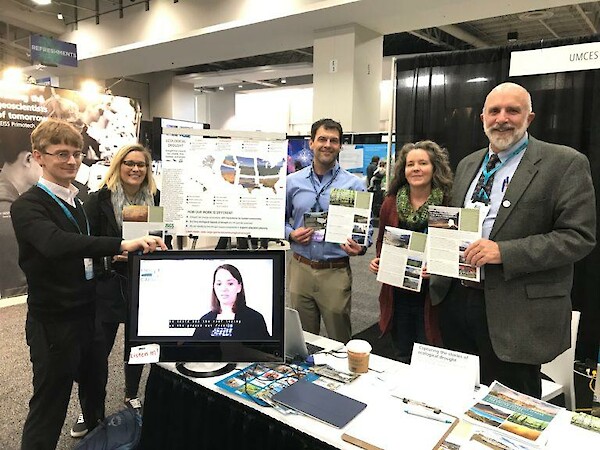
IAN had a great showing for the bi-annual AGU meeting in December in Washington, D.C. IAN staff manned 2 booths: one displaying newsletters and videos created for the USGS: Climate Change Research Activities Synthesis Project and another displaying report cards and visualizations created in a collaborative effort with the WWF called Healthy Rivers for All. Read more in Yesenia's blog here.
Belmont Forum
On December 8-10th 2018, IAN facilitated a Belmont Forum synthesis workshop in Washington D.C. Three groups of transdisciplinary research projects, focused on food security, mountains, and the Arctic, came together to share their findings and lessons learned. Stay tuned to IAN Press for the synthesis publication that is currently in the works!
Tuul River Basin Report Card 2019

Ulaanbataar, Mongolia. On 22 March 2019, the Tuul River Basin Report Card was released in Ulaanbaatar, Mongolia, with over 300 people attending the release event. Begun in 2017, this project was a partnership between IAN, the Tuul River Basin Authority, WWF-Mongolia, WWF-USA and Asian Development Bank. The IAN team involved in this truly memorable project included Simon Costanzo, Bill Dennison, and Dylan Taillie. Outcomes from the project include specific recommendations on improving water management within the basin, infrastructure upgrades and air pollution control measures.
Portland, Oregon
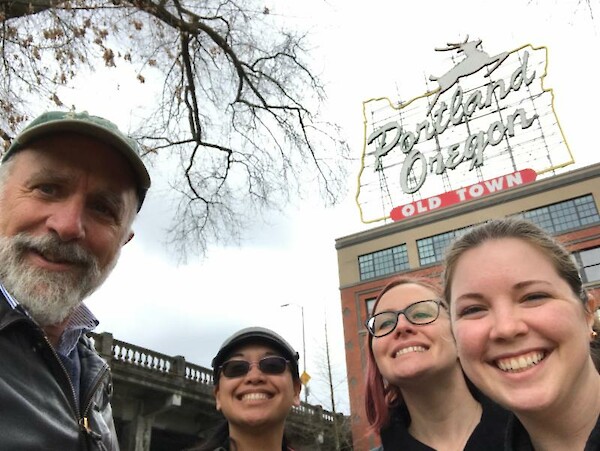
Bill Dennison, Katie May Laumann, Suzi Spitzer and Vanessa Vargas-Nguyen attended the Society for Applied Anthropology conference “Engaging Change in Turbulent Times” last month. Suzi organized a session on transdisciplinary science that included these topics: IAN as a boundary organization, integrating cultural and natural resources at National Parks, environmental report cards and citizen science. This conference was timely as IAN continues to journey into social sciences.
Ecosystem transformation
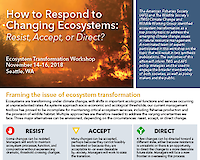
Bill Dennison and Yesenia Valverde facilitated a workshop on ecosystem transformation for the American Fisheries Society and The Wildlife Society in Seattle. The workshop produced a newsletter and submitted papers for their respective society journals in preparation for their first ever joint conference in Reno, Nevada later this year
International Riversymposium in Australia
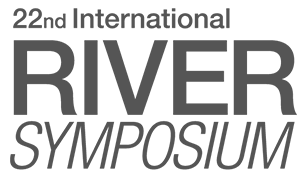
The International RiverSymposium in Brisbane, Australia this year focused on the Resilient Rivers Blueprint, which is a great direction for us at IAN. Bill Dennison, Heath Kelsey and Simon Costanzo participated this year, presenting on the Lake Erie, Kafue River, Tuul River Report Card projects, respectively. We also facilitated a 3-hour Learn, Inspire, Transform (LIT) session, in which we played SNAP, and followed up with a role playing session where participants advocated for their individual interests at first. Midway through the session, a flood occurred that forced participants to think about the system in a different, holistic way. Participants devised ways to work together to advance multiple interests, and to achieve a resilient river.
CERF Conference in Mobile, Alabama
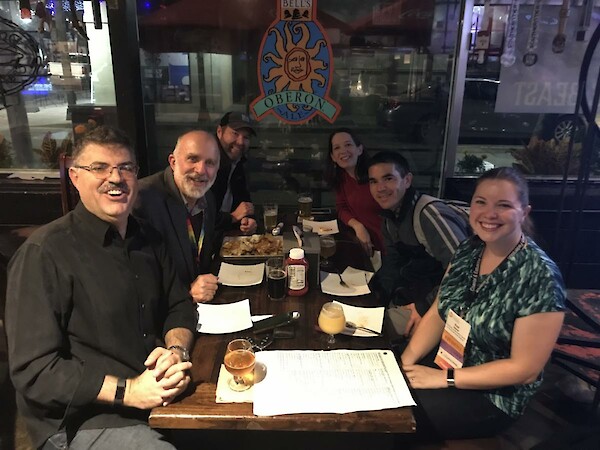
Multiple IAN scientists presented at the week-long 2019 Coastal and Estuarine Research Federation conference in Mobile, Alabama. Staff chaired several sessions on topics including coastal environmental management, citizen science, and seagrasses. IAN also led two conference workshops on science communication and data synthesis. Presenters included Bill, Heath, Caroline, Katie May, Vanessa, and Suzi. In addition, IAN staff attended the UMCES reunion and manned the UMCES booth, participating in the UMCES selfie contest and survey (see the results here!).
Verde River conference in Camp Verde, Arizona
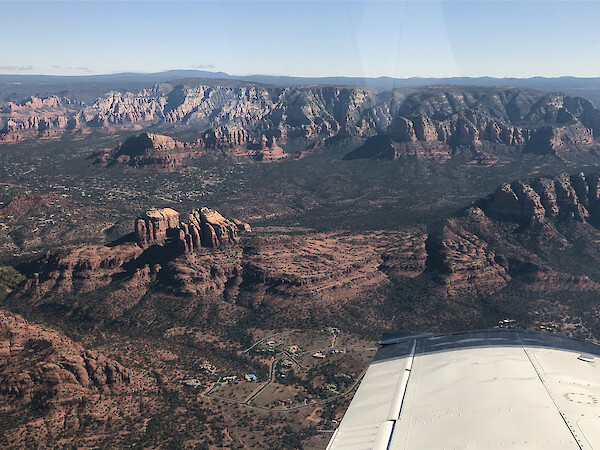
Bill Dennison, Andrew Elmore, and Emily Nastase attended the second biennial State of the Verde Watershed conference. Focus groups discussed the preliminary results of the Verde River Watershed Report Card. Report card indicator methods and scores were generally well-received, although some adjustments will be made moving forward. Thanks to the hard work of the report card team and input from conference participants, the Verde River Watershed Report Card is on track to be released in February 2020. Read Emily's blog about the conference here.
Online River Academy science communication training course
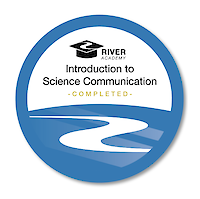
River Academy, the latest initiative from International River Foundation, is an interactive learning platform. Current course offerings include Leadership for River Practitioners, River Resilience, Science Communication, and River Restoration - Form and Function. IAN is developing the introductory course in Science Communication, which will cover topics ranging from storytelling strategies, to color theory, to data visualization. Upon completing a course with River Academy, participants will be issued a digital badge to showcase on their CV/resume.
Professional Certificate in Science for Environmental Management

UMCES is offering free online courses through EdX, a non-profit global provider of massive open online courses. Registration is now open! Certification for each course can be acquired through a small fee. Upon completing all four courses, students will earn a Professional Certificate in Science for Environmental Management. Communicating science effectively starts January 18, 2021. The other courses are: Developing socio-environmental report cards; Socio-environmental management; and Decision-making in socio-environmental management.
Due to the global coronavirus pandemic, ISBW14 and WSC2020 are postponed until summer 2022
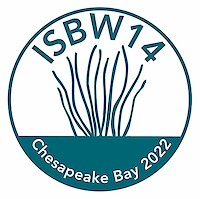
We will update everyone as we have more information. Please discontinue abstract submission at this time, and stay safe and healthy. Visit the ISBW14 website for more details.
Kicking off the COAST Card project

IAN-UMCES led the kick-off activities of our Belmont Forum-funded project, COAST Card (Coastal Ocean Assessment for Sustainability and Transformation), through a series of virtual meetings in September and October. The meetings brought together partners from the USA, Norway, Japan, Philippines, and India. COAST Card integrates socio-environmental report cards, social network analysis, and system dynamics modeling in global locations: the Chesapeake Bay (USA), Manila Bay (Philippines), Tokyo Bay and Ishigaki Island (Japan), and the Goa Coast of India. To learn more, please visit the project site.
Online River Academy science communication training course

River Academy, the latest initiative from International River Foundation, is an interactive learning platform. Current course offerings include Leadership for River Practitioners, River Resilience, Science Communication, and River Restoration - Form and Function. IAN is developing the introductory course in Science Communication, which will cover topics ranging from storytelling strategies, to color theory, to data visualization. Upon completing a course with River Academy, participants will be issued a digital badge to showcase on their CV/resume.
Due to the global coronavirus pandemic, ISBW14 and WSC2020 are postponed until summer 2022

We will update everyone as we have more information. Please discontinue abstract submission at this time, and stay safe and healthy. Visit the ISBW14 website for more details.
Online River Academy science communication training course

River Academy, the latest initiative from International River Foundation, is an interactive learning platform designed to teach anyone in river-related topics. Current course offerings include Leadership for River Practitioners, River Resilience, Science Communication, and River Restoration - Form and Function. IAN is developing the introductory course in Science Communication, which will cover topics ranging from storytelling strategies, to color theory, to data visualization. Upon completing a course with River Academy, participants will be issued a digital badge to showcase on their CV/resume.
Due to the global coronavirus pandemic, ISBW14 and WSC2020 are postponed until summer 2022

We will update everyone as we have more information. Please discontinue abstract submission at this time, and stay safe and healthy. Visit the ISBW14 website for more details.
Online River Academy science communication training course

River Academy, the latest initiative from International River Foundation, is an interactive learning platform designed to teach anyone in river-related topics. Current course offerings include Leadership for River Practitioners, River Resilience, Science Communication, and River Restoration - Form and Function. IAN is developing the introductory course in Science Communication, which will cover topics ranging from storytelling strategies, to color theory, to data visualization. Upon completing a course with River Academy, participants will be issued a digital badge to showcase on their CV/resume.
Due to the global coronavirus pandemic, ISBW14 and WSC2020 are postponed until summer 2022

We will update everyone as we have more information. Please discontinue abstract submission at this time, and stay safe and healthy. Visit the ISBW14 website for more details.
"Evaluating Transdisciplinary Approaches" now available online
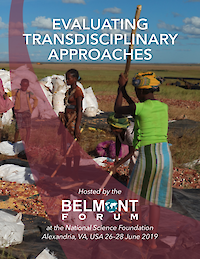
The Evaluating Transdisciplinary Approaches Workshop was convened by the Belmont Forum last summer. Workshop participants were part of a growing community of transdisciplinary research supporters and practitioners. The workshop goals were centered around participants exploring transdisciplinary research goals, metrics, and assessment. This workshop newsletter compiles the results of the workshop, outlines recommendations for how to evaluate transdisciplinary approaches, and provides current and past examples of transdisciplinary research.
Online River Academy science communication training course

River Academy, the latest initiative from International River Foundation, is an interactive learning platform designed to teach anyone in river-related topics. Current course offerings include Leadership for River Practitioners, River Resilience, Science Communication, and River Restoration - Form and Function. IAN is developing the introductory course in Science Communication, which will cover topics ranging from storytelling strategies, to color theory, to data visualization. Upon completing a course with River Academy, participants will be issued a digital badge to showcase on their CV/resume.
Due to the global coronavirus pandemic, ISBW14 and WSC2020 are postponed until summer 2022

We will update everyone as we have more information. Please discontinue abstract submission at this time, and stay safe and healthy. Visit the ISBW14 website for more details.
The Office of the Great Barrier Reef institutional assessment was published
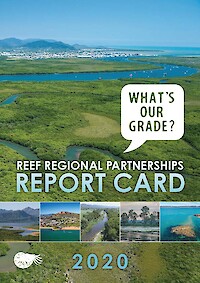
Bill Dennison and Simon Costanzo conducted an institutional assessment for the Office of the Great Barrier Reef. In this assessment, five goals were established: cohesive staff, credible science, resilient organization, relevance to stakeholders, and effective outreach. Each goal had its own set of indicators. Scores were generated for the Wet Tropics Waterways, Dry Tropics Partnership for Healthy Waters, Healthy Rivers to Reef Partnership, Fitzroy Partnership for River Health, and Gladstone Healthy Harbour Partnership, as well as an overall report card for the partnership as a whole.
The COAST Card project received a virtual kick-off
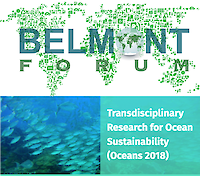
Bill Dennison and Vanessa Vargas-Nguyen attended the virtual kick-off meeting for the Belmont Forum projects funded under the Ocean Sustainability Collaborative Research Action (CRA) held on June 17–18. Their project, Coastal Ocean Assessment for Sustainability and Transformation (or COAST Card), is one of the thirteen international consortia of researchers and stakeholders awarded to conduct transdisciplinary research to innovate solutions for the sustainable use of oceans and minimize the effects of global change.
Attending the virtual Science of Team Science conference
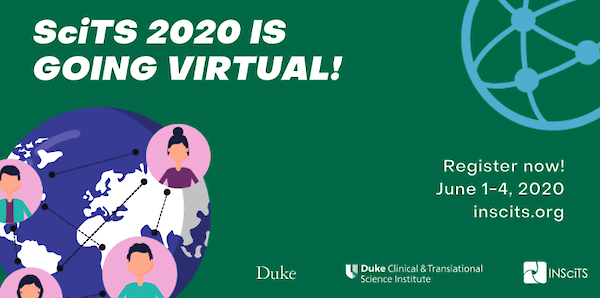
Bill Dennison, Heath Kelsey, and Suzi Spitzer attended the Science of Team Science conference, which utilized virtual session formats to highlight cross-disciplinary collaborative research. Bill spoke about IAN's role as a boundary organization that is helping transition academia to environmental problem solving. Suzi presented part of her dissertation on citizen science, featuring IAN's earlier work in developing a volunteer monitoring program for aquatic grasses in the Chesapeake Bay.
COMING SOON: RiverDialogue featuring Bill Dennison
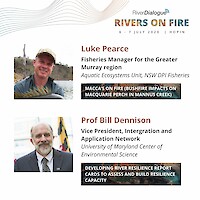
The International River Foundation is hosting a RiverDialogue "Rivers on Fire" seminar on July 6–7, featuring IAN's Bill Dennison as a speaker. The second event in the Rivers on Fire series gives participants the opportunity to hear more and delve deeper into the effects of fire on fires, catchments, and their communities. The program will run across two half-days and will bring together experts from government, industry, science, and community with the aim to raise awareness and create a call for action to address the effects of fire on waterways and their surrounding communities.
COMING SOON: online River Academy science communication training course

River Academy, the latest initiative from International River Foundation, is an interactive learning platform designed to teach anyone in river-related topics. Current course offerings include Leadership for River Practitioners, River Resilience, Science Communication, and River Restoration - Form and Function. IAN is developing the introductory course in Science Communication, which will cover topics ranging from storytelling strategies, to color theory, to data visualization. Upon completing a course with River Academy, participants will be issued a digital badge to showcase on their CV/resume.
Due to the global coronavirus pandemic, ISBW14 and WSC2020 are postponed until summer 2022

We will update everyone as we have more information. Please discontinue abstract submission at this time, and stay safe and healthy. Visit the ISBW14 website for more details.
Coming soon: online River Academy science communication training course
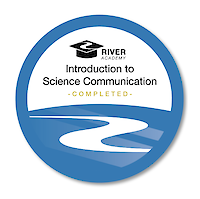
River Academy, the latest initiative from International River Foundation, is an interactive learning platform designed to teach anyone in river-related topics. Current course offerings include Leadership for River Practitioners, River Resilience, Science Communication, and River Restoration - Form and Function. IAN is developing the introductory course in Science Communication, which will cover topics ranging from storytelling strategies, to color theory, to data visualization. Upon completing a course with River Academy, participants will be issued a digital badge to showcase on their CV/resume.
International Seagrass Biology Workshop POSTPONED
Due to the global coronavirus pandemic, ISBW14 and WSC2020 are postponed until summer 2022. We will update everyone as we have more information. Please discontinue abstract submission at this time, and stay safe and healthy. Visit the ISBW14 website for more details.
UMCES and USGS kick off a new science synthesis project
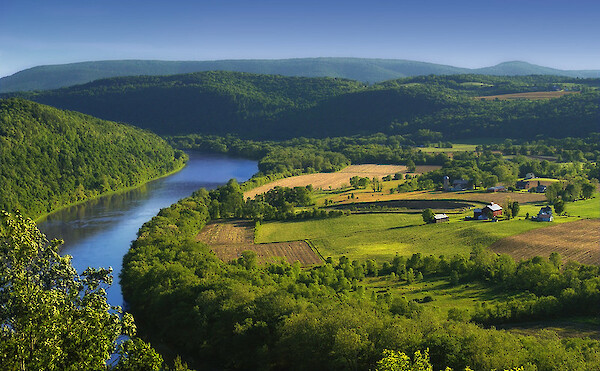
This project aims to translate and synthesize existing USGS scientific research and knowledge to inform conservation and restoration in the Chesapeake Bay watershed and other critical landscapes. Subject matter experts will convene virtually to develop and draft a newsletter summarizing nutrient trends in the Chesapeake Bay watershed. Participants represent UMCES, USGS, and the U.S. EPA Chesapeake Bay Program.
Due to the global coronavirus pandemic, ISBW14 and WSC2020 are postponed until summer 2022

We will update everyone as we have more information. Please discontinue abstract submission at this time, and stay safe and healthy. Visit the ISBW14 website for more details.
Moving to the "new normal"
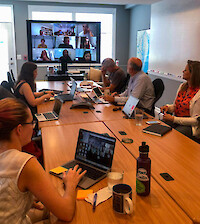
Meetings and workshops are essential for scientists and resource managers to share information and knowledge, achieve consensus, and co-create material. We at IAN have been facilitating in-person workshops around the world to engage with diverse stakeholders and co-create science communication products. The current pandemic has made in-person meetings impossible, and such meetings are likely to become less frequent well into the future. The IAN team is pushing forward by holding virtual workshops, employing our videoconferencing and facilitation experience and skills. This strategy has the additional benefits of a) reducing the IAN carbon footprint, b) reducing time lost in long and difficult travel, and c) being able to increase the global dissemination and impact of IAN efforts. We plan to use our experience in video conferencing and facilitation to facilitate virtual workshops. Read Bill Dennison's blog about IAN's facilitation experience here.
Due to the global coronavirus pandemic, ISBW14 and WSC2020 are postponed until summer 2022

We will update everyone as we have more information. Please discontinue abstract submission at this time, and stay safe and healthy. Visit the ISBW14 website for more details.
Developing new international report cards
Bill Dennison and Vanessa Vargas-Nguyen will be leading an international collaboration to develop innovative report cards for iconic embayments around the world. The four-year project, called "COAST Card," will develop report cards in Chesapeake, Manila, and Tokyo Bays as well as the Goa coast of India. This project is funded through the Belmont Forum, an international partnership that mobilizes funding of environmental change research from over two dozen counties in an effort to remove critical barriers to sustainability.
International Seagrass Biology Workshop 2020

In August 2020, IAN will be hosting the fourteenth biennial International Seagrass Biology Workshop (ISBW14) in Annapolis, Maryland. The theme of the conference is "Signs of Success: Reversing the Course of Seagrass Degradation." Visit the ISBW14 website for more information.
Developing new international report cards
Bill Dennison and Vanessa Vargas-Nguyen will be leading an international collaboration to develop innovative report cards for iconic embayments around the world. The four-year project, called "COAST Card," will develop report cards in Chesapeake, Manila, and Tokyo Bays as well as the Goa coast of India. This project is funded through the Belmont Forum, an international partnership that mobilizes funding of environmental change research from over two dozen counties in an effort to remove critical barriers to sustainability.
Revamping the Chesapeake Bay Report Card
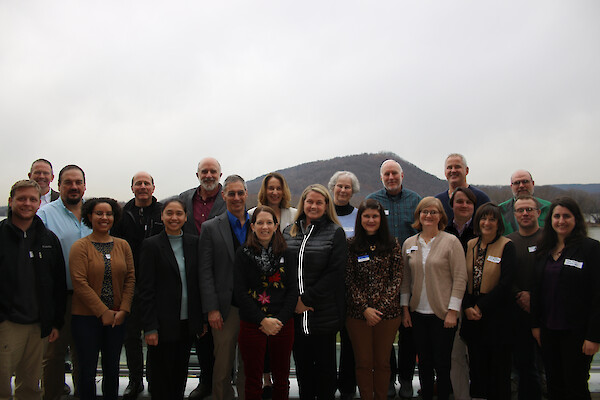
From January 7–8, IAN staff traveled to Harrisburg, PA for a workshop to expand the Chesapeake Bay Report Card. Bill, Caroline, Alex, Sky, and Vanessa facilitated and presented at the workshop. The workshop brought together stakeholders to discuss how to include watershed and socioeconomic data in future report cards. Watershed reporting regions were developed and numerous new indicators were discussed. Moving forward, there will be another workshop held in Virginia this spring to further refine the indicators and data analysis methodology.
International Seagrass Biology Workshop 2020
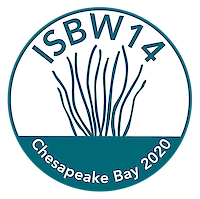
In August 2020, IAN will be hosting the fourteenth biennial International Seagrass Biology Workshop (ISBW14) in Annapolis, Maryland. The theme of the conference is "Signs of Success: Reversing the Course of Seagrass Degradation." Visit the ISBW14 website for more information.
Belmont Biodiversity Newsletter
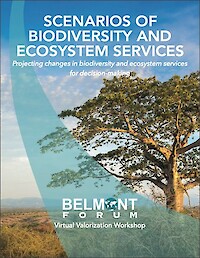
This document summarizes four projects funded by the Belmont Forum's Scenarios of Biodiversity and Ecosystem Services.
Belmont Global Change Newsletter
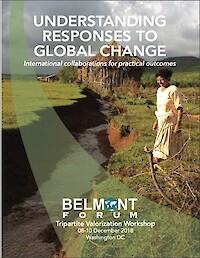
We facilitated a Belmont Forum synthesis workshop covering three groups of projects addressing global change, and produced a summarizing newsletter.
Texas Coast Report Card
IAN staff and HRI scientists collaborated to produce the 2019 Texas Coast Ecosystem Health Report Card. The coastline scored a B- (80%), indicating moderately good ecosystem health.
SAV watchers
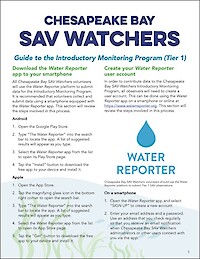
We developed a system for citizen science monitoring of Submersed Aquatic Vegetation (SAV) in the Chesapeake Bay. Using the new system, volunteers can collect consistent and useful SAV data.
USGS Eco-drought reports
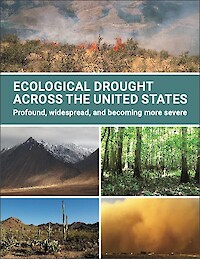
This newsletter summarizes the findings of a three-year synthesis on the current status of drought research across the United States, part of a larger-scale information dissemination project in partnership with the U.S. Geological Survey.
Professional Certificate in Environmental Management for Sustainability courses
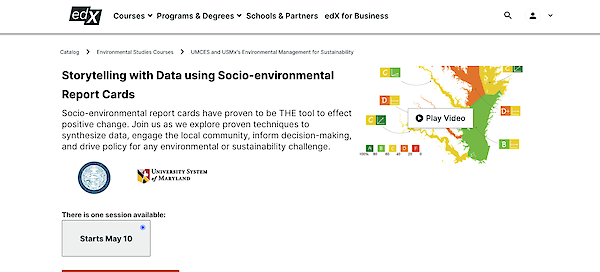
We are excited to announce that our Storytelling with Data Using Socio-environmental Report Cards course will be live this upcoming Monday, May 10th! This is our second course in the Professional Certificate in Environmental Management for Sustainability. Pro tip: consider enrolling as a verified learner to have access to bonus materials and extra resources.
Socio-environmental report cards have proven to be THE tool to effect positive change. Enroll here today, and join us as we explore proven techniques to synthesize data, engage the local community, inform decision-making, and drive policy for any environmental or sustainability challenge.
Developing a framework for an Environmental Justice Index in the Chesapeake Bay Watershed

Environmental justice requires providing fair treatment and meaningful involvement of all people, regardless of race, color, national origin, or income, with respect to the environment. The Marine, Estuarine, & Environmental Science graduate program within the University System of Maryland sponsors a suite of unique Issue Study Group courses in which students, faculty, and staff from a variety of campuses collaborate to develop tangible products. This newsletter summarizes the findings of a course entitled “Developing an Environmental Justice Index for the Chesapeake Bay Watershed Report Card,” conducted in spring 2021. In addition to this newsletter, blog posts were written and a video was produced.
New online course available

The next course in our partnership with the EdX online platform is now available! "The Science Advisory Toolbox for Environmental Management" has free registration, with an optional upgrade to receive a professional certificate at the end of the series.
There is a broad spectrum of ways that science can be incorporated into environmental management and policy and it all begins with effectively articulating cause and impacts. We will begin this course with a survey of early conservation thought-leaders that changed the conversation about how humans view their natural world. As our understanding of our natural world has grown in depth and complexity, so has the need for implementing new communication tools to best express this knowledge in a way that is accessible and actionable. Synthesis of data into a compelling story is the solution. You will develop your own toolbox of science advisory techniques while growing your environmental management knowledge base.
Taught by leading experts in the field with real world examples and studies, this course will show you how today’s conservation leaders can still “change the conversation” and guide society toward solutions for complex resiliency and sustainability problems that benefit all stakeholders and future generations.
Darwin Harbour Integrated Report Card now available
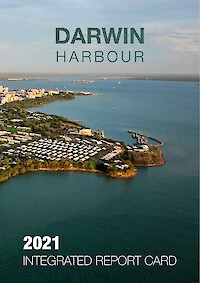
The Darwin Harbour Integrated Report Card was released on October 12. This report card has been developed through extensive consultation with stakeholders from the Darwin Harbour region and relies heavily on their knowledge and expertise.
Initiated by the Darwin Harbour Advisory Committee, a series of workshops were held in March 2020, representing the first step in this report card journey. Stakeholders from government, Indigenous communities, industry, academia and non-government organisations gathered in and around Darwin Harbour to conceptualise the harbour and its catchment, identify the environmental, social, Indigenous cultural and economic values of the region, and discuss indicators and thresholds that could be used to assess these values.
A total of 12 values were identified from these workshops and numerous potential indicators were proposed. The final choice of indicators used in this inaugural report card were ultimately dictated by data suitability and availability. In some instances, no data were available to confidently assess the health of certain values. In August 2021, report card findings were presented back to the stakeholders for their review and input.
Online professional certificate in environmental management for sustainability

This year, we launched our first professional certificate program in Environmental Management for Sustainability on EdX, an online learning platform for open online courses. All four courses are self-paced and available in five languages (English, Spanish, Filipino, Japanese, and Hindi). A professional certificate is available for verified learners, and all content is available for free. For more information, visit our certificate page on EdX.
Erasmus Mundus Scicomm instruction
Bill Dennison was one of the co-instructors for an Erasmus Mundas course in WAter and COastal MAnagement (WACOMA) with graduate students from the European Union. The Erasmus Mundas program is a joint Masters delivered by an international partnership of European universities. Bill presented modules on seagrass research, conservation and management; Coupled human and natural systems; Environmental management; Science communication; Socio-environmental assessment. One of the graduate students from this program will be joining the IAN group this spring to work on governance indicators for the Chesapeake Bay & Watershed Report Card.
New edX Course Released
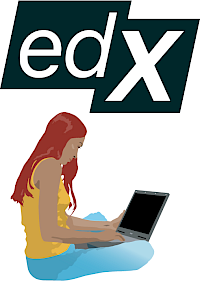
A new Professional Certificate in Environmental Project Management is being developed by IAN and partners from the Clark School of Engineering, University of Maryland. The first of three courses is now available on the edX platform. This course is entitled "Stakeholder Outreach: Effectively communicating complex environmental and societal threats".
Expand your skillset with our latest professional certificate
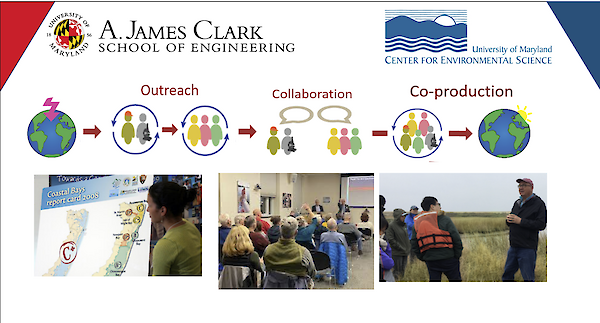
An exciting new Professional Certificate in Environmental Project Management was recently launched. Scientists from the University of Maryland Center for Environmental Science partnered with engineers from the University of Maryland College Park to co-develop training materials for learners interested in developing leadership skills in environmental project management. This unique combination of skill sets will aid both early career and senior practitioners. The Professional Certificate includes the following courses:
- Stakeholder Outreach: Effective Communication of Complex Environmental Threats
- Stakeholder Collaboration: Organizing for Environmental Justice and Equitable Solutions
- Co-Production: Addressing Complexity with Environmental Adaptive Management

